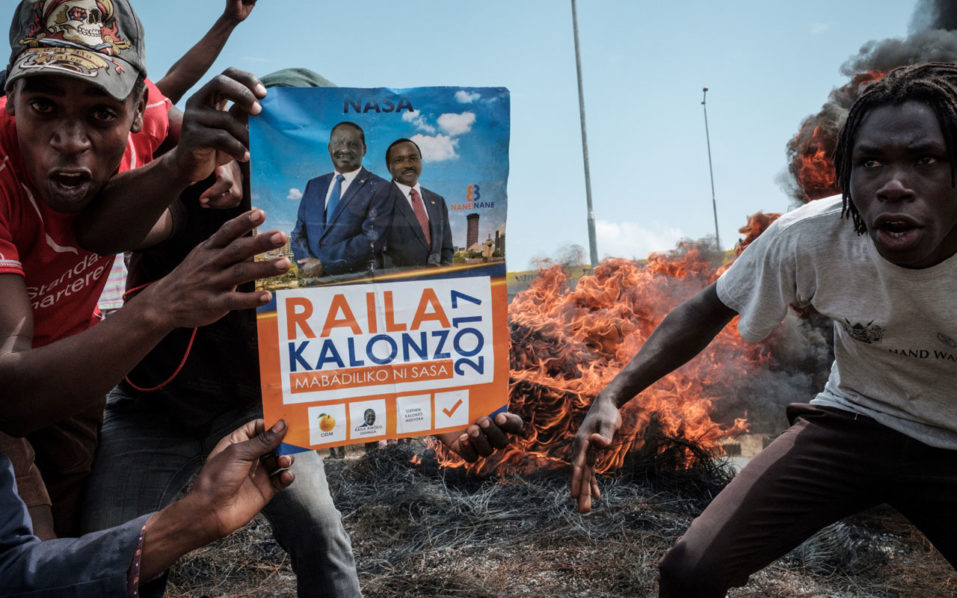
Opposition leader Raila Odinga said Tuesday he was suspending a protest campaign after three people were shot dead in demonstrations against Kenya’s election body.
The National Super Alliance (NASA) coalition had earlier said the protests would resume on Wednesday after pausing for a day in a tribute to the victims.
“In honour of the innocent victims of the state, our protests will stay suspended. On Friday, we will mark the memory of these victims as heroes of the struggle for electoral justice,” Odinga said in a statement.
Odinga said the party would communicate “our next course of action” on Friday.
The announcement marks the latest twist in a drama that has plunged the east African nation into its biggest political crisis in a decade. In 2007, a disputed election led to politically-motivated ethnic violence that left more than 1,100 dead.
Odinga launched a protest campaign three weeks ago against the Independent Electoral and Boundaries Commission (IEBC).
He said the panel had failed to properly reform since the Supreme Court annulled an August 8 presidential election over irregularities in the counting process and mismanagement by the IEBC.
On Friday last week two protesters were shot dead by police in Odinga’s rural home of Bondo, in the west of the country.
On Monday an 18-year-old man was shot dead during a protest in Kisumu. His mother insisted he was not taking part and had merely gone to buy ice cream.
The protests, concentrated in Kisumu but with smaller crowds seen in Nairobi and coastal Mombasa, have seen opposition supporters setting tyres alight, lobbing stones at police and in some cases looting stores and destroying property.
Security Minister Fred Matiangi banned protests in main cities last Thursday, citing lawlessness from opposition supporters.
However, the country’s high court temporarily suspended this ban on Tuesday, until it could fully hear a complaint from the opposition.
Odinga last week announced he was withdrawing from the race, arguing the move would legally force the IEBC to begin the whole process from scratch, which would allow more time for deep reforms.
Despite the confusion over what Odinga’s withdrawal means, election officials appear to be pushing forward with plans to hold the vote as scheduled on October 26.
President Uhuru Kenyatta has yet to sign into law new election legislation that has been in front of him for five days — despite declaring he would do so without hesitation.
Odinga had said the amendments would merely make legal the “irregularities” cited by the Supreme Court.
The laws would allow manual vote counting to supersede electronically transmitted results and making tally forms count even if there is “a deviation from the requirements of the form”.
– IEBC can’t ‘correct’ results –
Also on Tuesday, Kenya’s Supreme Court issued a ruling to clarify the role of the IEBC in the verification and announcement of election results — after the commission was lambasted for announcing an outcome that could not be properly verified.
In Kenya, results from polling stations, compiled in a form 34A, are sent to 290 constituencies, where those results are then entered into a form 34B and tallied to determine the victor.
The court had berated the IEBC for declaring Kenyatta the winner on August 11 while all forms had not been provided, or were unsigned, lacked the requisite security features or contained irregularities.
The IEBC had asked the court what it should do if the constituency results did not match the results from the forms 34A.
Supreme Court deputy chief justice Philomena Mwilu said that in such a case IEBC chief Wafula Chebukati “cannot correct errors” spotted on form 34Bs.
Instead he must report inconsistencies to observers and election candidates, and allow the Supreme Court to resolve them if necessary.
The decision is important because it limits the potential for the falsification of results by IEBC officials.



